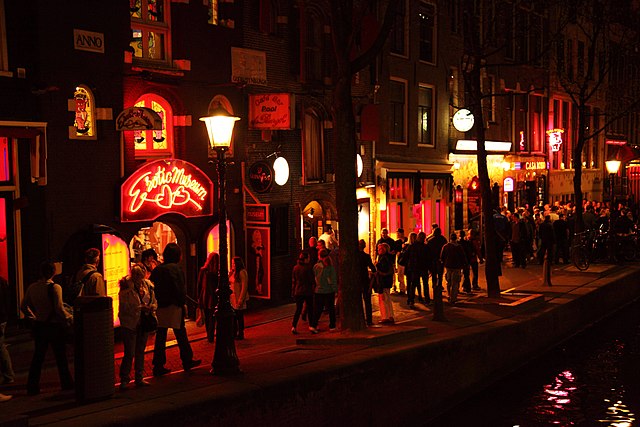Tours Menu

If you’ve landed on this page, you were probably looking for information to book a tour of Amsterdam’s Red Light District, or wondering why our company has decided to stop offering it.
I’d like to explain that decision to you in the first person, honestly and respectfully, because we feel we owe you that — as a traveller, as a customer and, above all, as a person. My name is David, and I’m a co-founder of Guías & Tours.
Most of us, when we first arrived in Amsterdam back in 2013–2015, felt something very similar: surprise and admiration.
We were coming from Spain, a society where topics like sex and prostitution were often wrapped in taboo, sensationalism or silence. In the Netherlands, however, we found a model that, at first glance, seemed much more advanced:
For a while, we genuinely believed that this was an interesting – and apparently more respectful – way of approaching a reality that exists in every society. We started from a key assumption: that there were people who, “of their own free will”, chose to work in the sex industry. And from that point of view, we understood that a tour of the Red Light District could be a cultural, historical and social experience, as long as it was handled with respect.
For many years, first as guides working for other companies and later in our own project, I and many members of our team led this tour. We explained the history, the legal and social background, shared some anecdotes and a bit of humour, but always with respect and almost an educational intention.
But over the years, something started to feel off.
As society changed, we changed too — both as guides and as people. Movements like #MeToo emerged; there was more public debate about patriarchy and the role of women in history and in our societies; power dynamics and sexual violence were increasingly questioned; and we began to listen to more testimonies and read more about the reality of prostitution and trafficking.
What we had previously taken for granted (“if it’s legal and regulated, it must be fairer”) stopped looking so simple.
We started asking ourselves uncomfortable but necessary questions:
As we dug deeper, spoke with locals, read reports, and followed the social debate, we were forced to confront a hard truth:
“Not everything that glows under the neon lights of the Red Light District is gold.”
The Dutch model is often presented as an example of a “modern” way of regulating prostitution. And it’s true that there is a legal framework and stricter controls than in many other countries. But over time, we stopped fully believing the official narrative.
Because having legislation that, in my view, “gives the system a clean face” is one thing; actually solving the underlying problems is another:
We came to see that, behind the discourse of individual freedom, there is still a great deal of inequality, pressure, and a lack of real alternatives. And that forced us, as a company, to look in an uncomfortable mirror:
Do we really want to be one more link in the chain that turns this reality into just another tourist attraction?
From that point on, we began discussing the issue seriously within the team: Xavi, Juan, me, and part of our staff. It wasn’t a quick or easy conversation. The Red Light District tour was in demand, it sold well, and many travellers asked for it almost automatically, as “one of those things you just do in Amsterdam”.
But there was something that weighed more than the numbers: our personal and professional convictions.
We understood that, although it is technically possible to run a “respectful” and “critical” tour — and there are companies in the city that try to do so — in practice there is still a clear imbalance: the Red Light District has become a stage, and the people working there end up being part of the show that visitors come to see.
And we don’t want to be part of that.
So, as partners and as a team, we made a clear decision:
We stopped offering Red Light District tours because, for ethical reasons and moral conviction, we do not want to contribute to trivialising a reality that is deeply complex and painful for many people.
It wasn’t a marketing decision. It was a matter of conscience.
The fact that we don’t offer this tour doesn’t mean we turn our backs on the topic. Quite the opposite. We continue to talk about Amsterdam’s history, its relationship with tolerance, personal freedoms, and its many contradictions.
On other routes through the city, when the context is right, we address these issues from a critical and respectful perspective.
We prefer to design experiences that put culture, history, diversity, and everyday local life at the centre, without turning anyone’s vulnerability into a selling point.
If you were thinking of booking a Red Light District tour with us, I hope these lines help you understand why you won’t find it in our catalogue.
We know there are other companies that still offer it. We’ve simply decided that this is not the path we want to follow.
Thank you for reading this far, for your understanding, and for choosing to travel with a critical, compassionate mindset. If you decide to discover Amsterdam with us, it will be a pleasure to show you the city from a more human, more conscious perspective — and, we believe, more in line with the kind of world we want to help build.
Warm regards,
On behalf of the whole Guides & Tours team in Amsterdam 💛